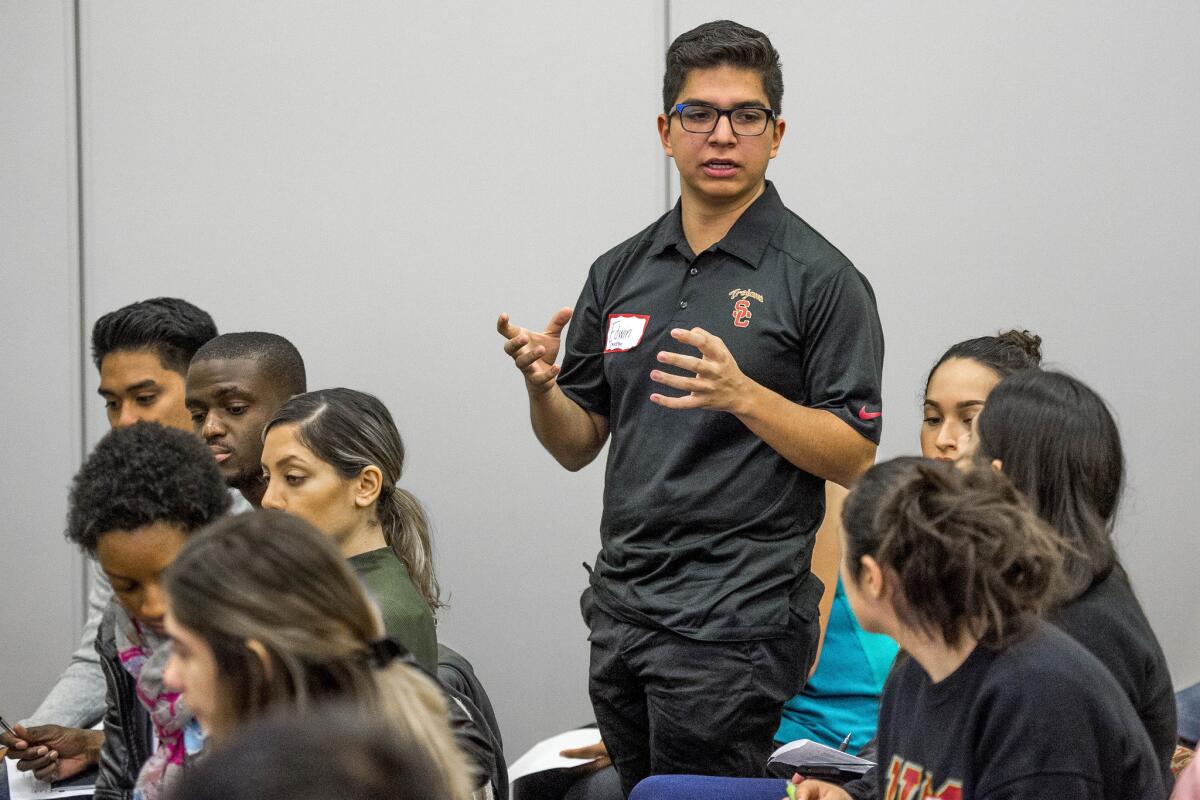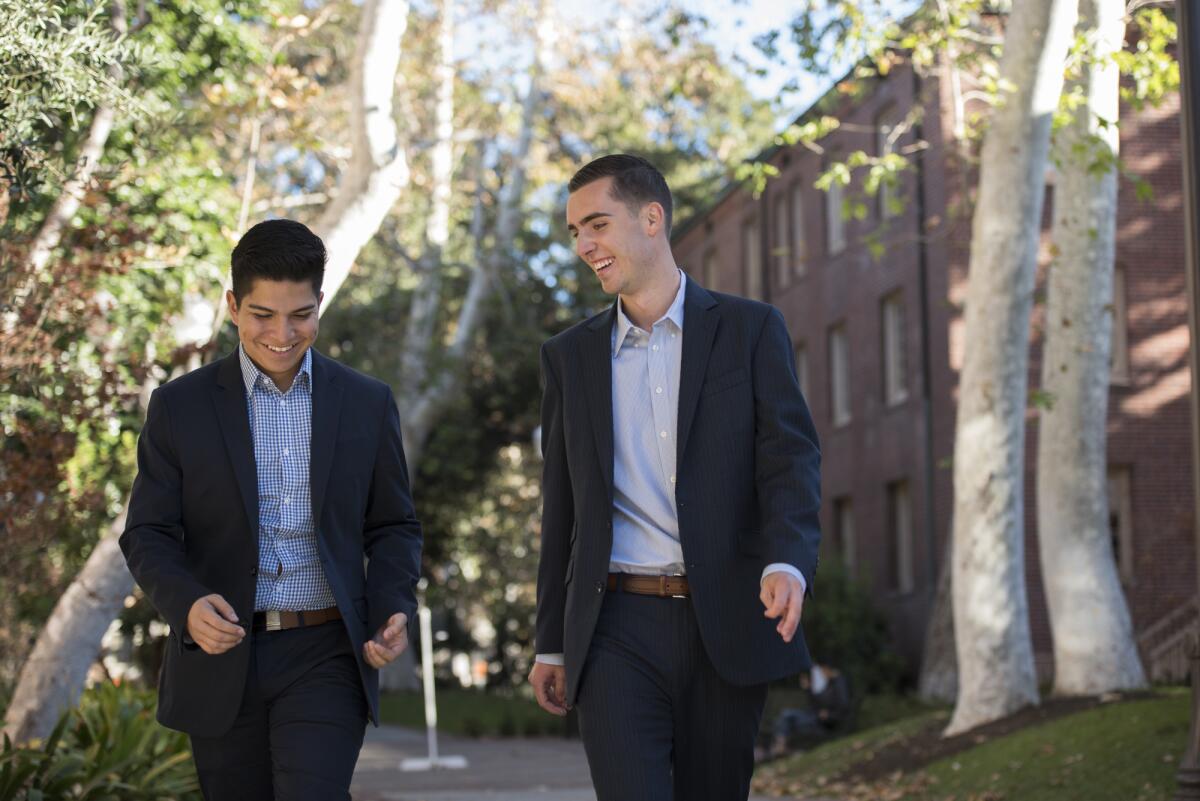Q&A: Campus conversation: Edwin Saucedo, USC student body president

Edwin Saucedo, in his first major speech as USC student body president, addresses the new freshman class at convocation in August, 2016.(Video by USC)
When Edwin Saucedo first set foot on campus, he doubted his USC classmates would consider him a peer, let alone someone “good enough” to be a voice for all 19,000 undergraduates. His parents had come to the U.S. from Mexico. He was the first in his family to attend college. He could afford USC because of multiple scholarships. His father was deported when he was 13, sparking his drive for social justice. While at South Gate High School, just southeast of USC, he took care of his two younger siblings and helped his mother, who cleaned homes and worked in cosmetics.
A public policy and political science student, Saucedo spends more than 30 hours a week listening to people’s concerns, speaking up at meetings and helping to implement the numerous campus initiatives he fought for.
He interned for former L.A. City Councilman
What sparked your interest in community leadership?
“My parents always told me that education was really the key to success ... and that was a big thing they instilled in us since a young age. My mom, unfortunately, had to drop out of school in fourth grade, and my dad dropped out in high school. And since kindergarten, education has always been my thing. It really became a safe haven for me. When everything was going wrong in my life, the only thing I knew that would be stable was education. No matter where I went and no matter what happened, there would always be a school there, and I really took that to heart.
“I joined student government in high school — and at first it was about planning the school dance and prom and graduation and all that stuff. But I found out that there was more that could be done. So I got involved a little bit with LAUSD [L.A. Unified School District] — they had a monthly meeting with school presidents — and one of the things that I realized is that oftentimes decision-makers come to you once the decision has been made and say, 'What do you think?' And even if you say ‘I don't think I like it,' they'll be like. 'Oh well, we already made the decision, so we're just telling you that it happened.' And that really sparked my interest to get involved. Being in student government, being in a leadership position, really gave me control over my own destiny and it also gave me the ability to speak up for others who weren't speaking up for themselves.”

At USC, supporting first-generation students has been your biggest issue. How did your own experience shape these initiatives?
“My first semester was really the first time in my life when I thought, ‘I don't think I'm smart enough and I don't think I'm good enough to be here.’ And I remember having a breakdown by November. I felt overwhelmed with schoolwork and just had so much going on, and that was really hard for me because I saw a lot of my peers calling their parents and asking for help or at least being able to talk about their experiences. I never had that opportunity. Talking to my mom about college is trying to explain the very simple things. She's also a non-English speaker, so a lot of the terms just don't translate as well. Those are the things that I wanted to address.
Out of this came the first-generation club. We just started it this year. It was an initiative by a couple other students, and it was about bringing these people together for the first time and creating this community … We now have a dinner with the provost at the beginning of the semester. There’s a first-generation student summit. We launched a YouTube live video [last month], and any first-gen student could log in and just watch a panel of students who were first-gen talk about their experience. Those are all things that didn't exist when I was a freshman, or when I was a senior in high school looking to come to USC. For me, it's really about how can you institutionalize something beyond a program? It shouldn't just be, ‘Cool, we have one event at the beginning of the semester, now you're out on your own.’”
Being in student government... gave me the ability to speak up for others who weren't speaking up for themselves.
— Edwin Saucedo, USC student body president

USC student leaders demand action against campus racism »
What other student groups need more attention?
“Low-income students… When I first took on a leadership position in the Executive Cabinet, I offered someone a position in our student government that was not paid, and they told me, ‘I can't afford to do that because taking the time to do that position would require me to quit my job and I have to take care of my family.’… That really broke my heart because I realized the experience of a lot of low-income students doesn’t stop at, 'I covered my expenses here at USC.' … Even though I was low-income coming to USC … I have a full ride and that gave me some privileges that I didn't even realize. I was a low-income student living a middle-income life in college.
So one of my biggest pushes was: How can we enable any student to be involved on campus without having to choose between getting a job or getting involved?
So I started a stipend last year, which we called the positional leadership stipend. We set aside $100,000 [from the student government budget], and it was a pilot program to see what we could do to support students who want to get into leadership positions but are worried they can't afford to do so. … It's not just about going to college anymore, it’s about those experiences that you have outside of the classroom. Those are really the empowering experiences that get you to your next job, that really make you successful post-college.
There’s that old stereotype that you had to be in Greek life to be president. What do you think your election says about the student body today?
“USC is changing rapidly. I've met people in the Latino community who are like, 'Wait, you are the student body president at USC? And this was a schoolwide election?’ Obviously there are misconceptions of USC that are still out there — and I don't want to say they are complete misconceptions, but people like Rini [Sampath, last year’s student president who drew national headlines when a student screamed a racial epithet and hurled a drink at her] were able to pave the way. I got to serve under her administration as one of her executive board members, and I think we were able to redefine what leadership meant and what leadership looked like at this university.
What do you want to do after graduation?
“I really want to go into public service and in the future, run for elected office in L.A. or South Gate. … I don't want to be that kid who got out, that made it and left everyone behind. My community is what helped me get to where I am today, and so it's really important for me to actively fight for my community. … The goal after graduation is to continue learning, to continue listening to other perspectives and encourage other individuals whose voices are not being heard, to tell their stories and to fight for their voices to be represented in each and every board room. ... I don't want to be on a pedestal for others, I want to be the springboard for more individuals to reach higher and do more amazing things than I did.”
Twitter: @RosannaXia
Sign up for Essential California
The most important California stories and recommendations in your inbox every morning.
You may occasionally receive promotional content from the Los Angeles Times.








